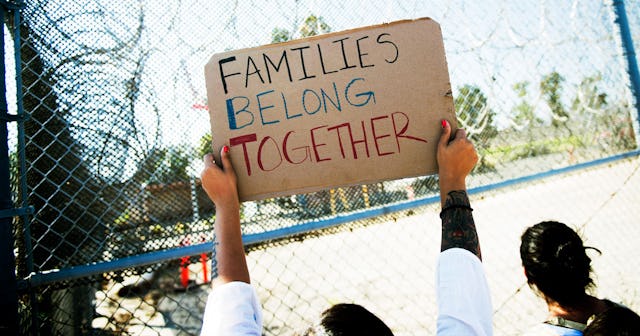The Youngest Child Separated From Parents At The Border Was Only 4 Months Old

The youngest person separated from their family at the border was a four-month-old baby
Shocking stories of trauma and cruelty emerge weekly from the border crisis, where the Trump Administration’s xenophobic policies only seem to make things worse for the growing number of migrants desperately trying to enter the United States to seek asylum. Many of the stories are related to Trump’s “Zero Tolerance” policy, which separated thousands of minors from their parents, all without tracking families in a reliable manner, and all without a plan of what to do next.
Just this week, the New York Times reported on the person that could be the youngest to be separated from his parents before federal judges struck down the policy – a baby named Constantin Mutu, who was just four months old when taken from his mom and dad.
Unlike most families at the border, the Mutu family is from Romania. His parents, Vasile and Florentina, are Roma, a minority group with a long history of enslavement, violence, forced sterilization, and discrimination in Europe. After a life of poverty, begging, and odd jobs, the family sold their house and left for Mexico, where someone promised to transport them to the U.S. border, where they could seek a new life. Of their five children, they brought their youngest two with them, including four-month-old Constantin.
Vasile and Florentina were separated on a bus ride to the border, and with no way to communicate, Vasile and the baby, who was running a fever, crossed to a border station and asked for asylum. But during the process, border authorities took the baby from his father without explanation. He was so crushed that he cried constantly while detained over the next two months — he would even be beaten by his cell mates and given a psychological evaluation.
“The police wiped the floor with me,” he told the Times through a translator. “I started crying because I didn’t know what to do. I couldn’t speak English. I told them, ‘I don’t understand. Why?’”
Florentina and the older child returned home upon discovering what happened, and Vasile agreed to leave on the basis that he would be reunited with his baby — but it wouldn’t happen for months.
Constantin was transported to Michigan where the foster system was shocked to see a child so young, even among the growing stream of migrant children into the system. He was placed in a rural home and well cared for — although even his foster parents knew that the best place for him was with his parents. They made desperate, weekly video calls for months trying to get their baby back.
At eight months, Constantin finally had his day in court. The judge decided he should fly home to his parents on the government’s dime, and he was finally off. But when he was reunited with his mother, he cried for his foster mother, who he had known longer than the woman who gave birth to him.
Like many kids who were separated for months, he experienced ongoing traumas of upheaval and separations, not just one.
Now, at 18 months, Constantin is having an extremely difficult time readjusting to his life, where everything is starkly different from his foster family’s way of life. He has yet to say a word, and he can’t walk. He’s also frightened by key aspects of his family’s culture, like noise and crowds, and not used to the family’s ongoing struggle with poverty.
Back in Michigan, his foster parents were so traumatized by the events that they took time off from fostering. Constantin’s case worker also quit her job after all of the migrant children in her caseload were reunited with their parents.
“I just couldn’t get over it,” she said. “So if I couldn’t get over it, imagine the kids.”
Even though the “Zero Tolerance” policy of separating minor kids from their parents was struck down in federal court, the crisis at the border continues with reports of overcrowding, sexual abuse, and the deaths of children. Just last week, Trump further cut funding from programs for immigrant children, including recreation and English lessons.
While part of the issue is, without a doubt, a growing tide of families fleeing violence and poverty from around the world, we are dealing with the issue in the exact wrong way, focusing on building a wall that won’t work in place of solving the actual problem, or treating the people fleeing to our border with the humanity that all people deserve.